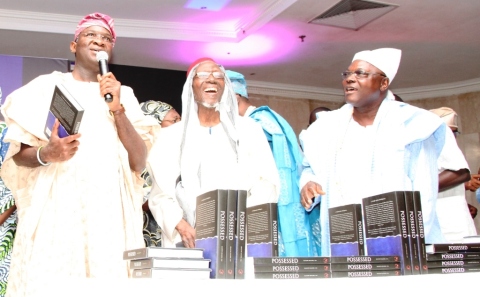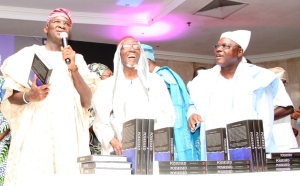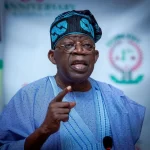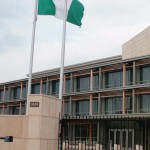FG Can’t Claim Ownership Of Tafawa Balewa Square -Fashola
Featured, Latest Headlines Saturday, October 18th, 2014
By Ayo Balogun, Lagos
Lagos State Governor, Babatunde Fashola says the Federal Government cannot claim ownership of the Tafawa Balewa Square (TBS) as it belonged to the state government.
The governor, who spoke at the City Hall, Lagos, Nigeria, venue of the Public presentation a historic book on Lagos, “Possession- A History of Law and Justice In The Crown Colony of Lagos; 1861 – 1906,” authored by former Attorney-General and Commissioner for Justice of the State, Mr. Olasupo Shasore, said those who said they had sold the TBS are wallowing in absolute ignorance.

Lagos State Governor, Mr. Babatunde Fashola, SAN (left) presenting the Book, “POSSESSED – A History of Law and Justice in The Crown Colony of Lagos 1861 – 1906”, written by former Lagos State Attorney-General and Commissioner for Justice, Mr. Olasupo Shasore, SAN during the Book Presentation at the City Hall, Victoria Island, Lagos on Friday, October 17, 2014. With him is Chairman, Lagos State Microfinance Institution, Bashorun Alabi Macfoy (middle).
Fashola, who declared that the Square “can never be sold,” pointed out that the place used to be part of the land that belonged to the King of Lagos who was a Sovereign before the conquest and possession of Lagos by the British.
“It became a Crown Land administered by the British Crown and at the end of the Colonial Era it passed on to the Federal Republic of Nigeria and when Lagos was created as one of the first 12 states of the country in 1967, it became State Land and all of the lands the Federal Republic of Nigeria inherited from the Government of the United Kingdom were handed over to each of the states in which those lands were and Tafawa Balewa Square then metamorphosed from Race Course to Tafawa Balewa Square,” he said.
He maintained that the only legislation that existed today was the Tafawa Balewa Square Management Act by which the Federal Government was given managerial power as caretaker or agent and not owner of the Tafawa Balewa Square.
The governor said because of ignorance of the history of Lagos, most people make spurious assumptions and statements that offend the sensibility of Lagosians such as the one by the Federal Government, saying it has sold the Tafawa Balewa Square or the statement that Lagos is flooding because of the Eko Atlantic Project.
Speaking on the book, Fashola stressed the need for documentation and record keeping as building blocks of history and preservation of historical antecedents saying without records of past events the history of a people may be entirely lost.
He said the dearth of such records and the lack of documentation of historical events in the country have impacted negatively on upcoming generations who know little or nothing of their origin or learn of historical events in their country from foreign institutions.
Citing the example of young people who know little or nothing about the 30-month Nigerian Civil war, the Governor said the need to fill the gap informed his establishment of a Records and Archives Bureau in the State as a centre where citizens can submit memorabilia, documents, photographs or diary adding, “We will gladly receive it and acknowledge it and keep it for posterity.”
According to the governor, “when people say today that the Eko Atlantic Project is causing flooding because we are reclaiming land from the sea, I say they do not know the history of this land because from Modupe Osikoya Street now, which is the road in front of the Bar Beach, you needed to walk a distance of two to three kilometres before you saw water when I was a child.”
Fashola added that one of the most important facts the book has established is the sovereignty of Lagos before the coming of the British and the subsequent possession and conquest of Lagos, adding that although more races including African, Asians and Arabs now occupy the streets of London than the Englishman, there were original Londoners before those people came.
He said what has happened in London has also happened in Lagos where some hitherto rural villages have become a highly urbanized, commercial and multi-ethnic centre, adding, “Nothing is wrong with that because, perhaps, in another 500 years this place will not be like this”.
Oba of Lagos, His Royal Majesty, Oba Rilwan Akiolu 1, praised the author for seeking to preserve the history of Lagos saying that the importance of Lagos was always seen by the fact that anytime anyone said he was from Lagos people often take particular interest than when he said he was from any other state.
Elucidating more on the history of Lagos, Oba Akiolu said the author had done a marvellous job in bringing out the true essence of the Lagosians, adding that Lagos is known by its high level of accommodation of strangers which, according to him, brought about the name Eko-Akete, which means the land that prospers a stranger.
Praying that the author would achieve greater things in his future endeavours, the Oba, who said Shasore is a grandson of the land owning families of Lagos, declared, “This one that you have done, my prayer is that you shall live long, you shall be able to do greater things, Lagos has started to come out in true colours and it shall not go back.”
Related Posts
Short URL: https://www.africanexaminer.com/?p=18858




















